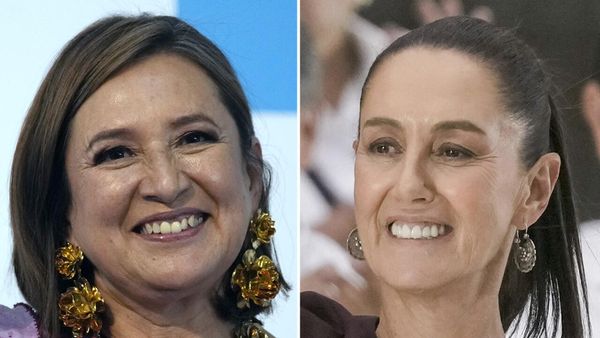
It’s not your typical industry conference.
Sure, there are some people wearing suits, and a lot of lanyards swinging around necks. There are seminars (35 on the 140-page program, with 125 speakers); international guests (617 from 35 countries); long lunches and even longer dinners.
But Beef2024 – the southern hemisphere’s largest beef industry event – is mainly a crowd of Akubras, checked shirts and RM Williams boots and belts. There are babes in arms and schoolchildren. There are kisses as friends reconnect. There are bulls and cows and carcass competitions and displays of million-dollar machinery.
Beef Week – or just Beef, to participants – has been held every three years since 1988 in Rockhampton in central Queensland. It is part exhibition and part celebration of Australia’s largest agricultural industry.
Over in the cattle precinct, where $44m worth of prime beef is on display, Phoebe Bridges – not the singer – is tending to bulls. “Beef is all about breed awareness for us,” she says. Bridges is representing Planchonella Hill Senepols, a breed originating in the Caribbean. They resemble Angus – except their coats are red. “A lot of people have heard about Senepols but not seen them in the flesh.”
Nearby, the Planchonella Hills owner Tony Baker and his son Liam are replacing bedding in the pens. Attending the expo is an investment, one they hope will pay off. “Our biggest concern is the cost of everything – the cost of the site, the cost to eat here – just being here is expensive – and it cost us $1,000 in fuel to transport 11 animals from northern New South Wales,” Baker says.
He adds: “Our cattle are grass fed with a bit of oats and we were debating whether we still had a place here at Beef with the grain-fed show cattle.
“But we are actually getting more interest because our cattle are grass-fed. People like to know that what they see is what they are going to get.”
The stud has done well, winning senior champion female and reserve junior champion female in the show ring.
In the spectator stands, another conversation is taking place. Renewable energy developments are a point of contention for many, concerned that the developments will harm agricultural land or remnant forest, and critical of the consultation processes.
Watching the parading cattle are members of the Kalapa and Wycarbah Local Action Committee, who are campaigning against developments including the proposed 372-megawatt Moah Creek windfarm, 30km west of Rockhampton. It’s one of 46 windfarms proposed for Queensland, many of which are slated to run along the top of the Great Dividing Range and would require extensive land clearing.
One member, Nick Holland, says he feels renewable projects are being “rushed through to meet net zero targets”.
“The construction of windfarms is bulldozing mountains and ripping out remnant vegetation that our family has protected for 100 years,” he says.
Sustainability and school students
Each Beef week has a different theme, according Jess Webb, one of the Beef Australia directors. “It may not be what Beef is driving but it is what the producers want to talk about,” she says. “For Beef2024 the emerging theme is carbon and the sustainability agenda.”
One corner of the exhibition is devoted to tech and innovation, startups that Webb says are “solving the carbon issues” – though scientists say the industry is oversimplifying the issue.
Webb is watching Pitch in the Paddock. Eight entrepreneurs are peddling their wares, from cattle identification using nose prints (every animal has a unique print), to mustering with drones, to “synbiotic” technology – a combination of prebiotics and probiotics – intended to reduce the methane produced in cattle guts.
The winner is a bovine breathalyser produced by Agscent, using technology developed by Nasa to detect pregnancy removing the need for an invasive test. Field trials have been funded by the federal future drought fund.
Walking away from the tech yards you find the schools program, where 3,800 students from 66 schools are listening to the presenters Greg Mills and Jasmine Cox talk all things agriculture. Among the schools in attendance is Rockhampton Grammar school, whose deputy head of primary school, Hayley Duggan, accompanied 500 students to the expo throughout the week.
“A lot of our students are boarders from properties out west and one of the big issues facing them is natural disasters in the form of floods and droughts,” Duggan says. “Beef is a positive experience for them because they can relate what they learn in our science curriculum to what they have experienced in real life.”
Some students have graduated to the trade stalls. Reece Brooke, 12, is working the Mama Melisse hot sauce stand in the lifestyle pavilion alongside his father, Anthony. Wearing a tradie’s belt stuffed with hot sauce bottles, Reece roams through the crowd, spruiking the sauce and his Instagram account.
“He is our brand ambassador,” Anthony Brooke says. The Brookes are rebuilding after their sports catering business collapsed during the pandemic.
“We started production during Covid and this year were awarded best hot sauce and Australian sauce of the year at the Australian Barbecue awards.”
They manufacture from the commercial kitchen of their local racecourse, and a dearth of appropriate machinery means they de-stem every chilli by hand.
On Beef’s final day, the crowd numbers come in. More than 119,000 gate movements have been recorded over five days. Forty political leaders, including the prime minister, Anthony Albanese, and the agriculture minister, Murray Watt, attended, with the latter speaking about trade and threats to exports.
More popular with the crowd are the country singer Troy Cassar-Daley and Buddy, the border collie pup who won the latest season of Muster Dogs.
Asked if she’s promoting women in agriculture, Buddy’s handler, Zoe Miller, replies: “I want to acknowledge all the young men in agriculture – we are all in this together.”
It’s a popular sentiment, with competition and rivalry taking second place to a common purpose: everyone is here to talk about the same industry, moving – mostly – in the same direction.
“We like Beef because of the new innovations, the convenience of everything in one spot and the chance to catch up with people we haven’t seen for ages,” says a Bowen grazier, Jessie Russell.
“But more importantly we love agriculture. We love the lifestyle that we can share with our family and our children, and we love that we are creating traditions and a legacy and that gives us pride in what we are doing.”







